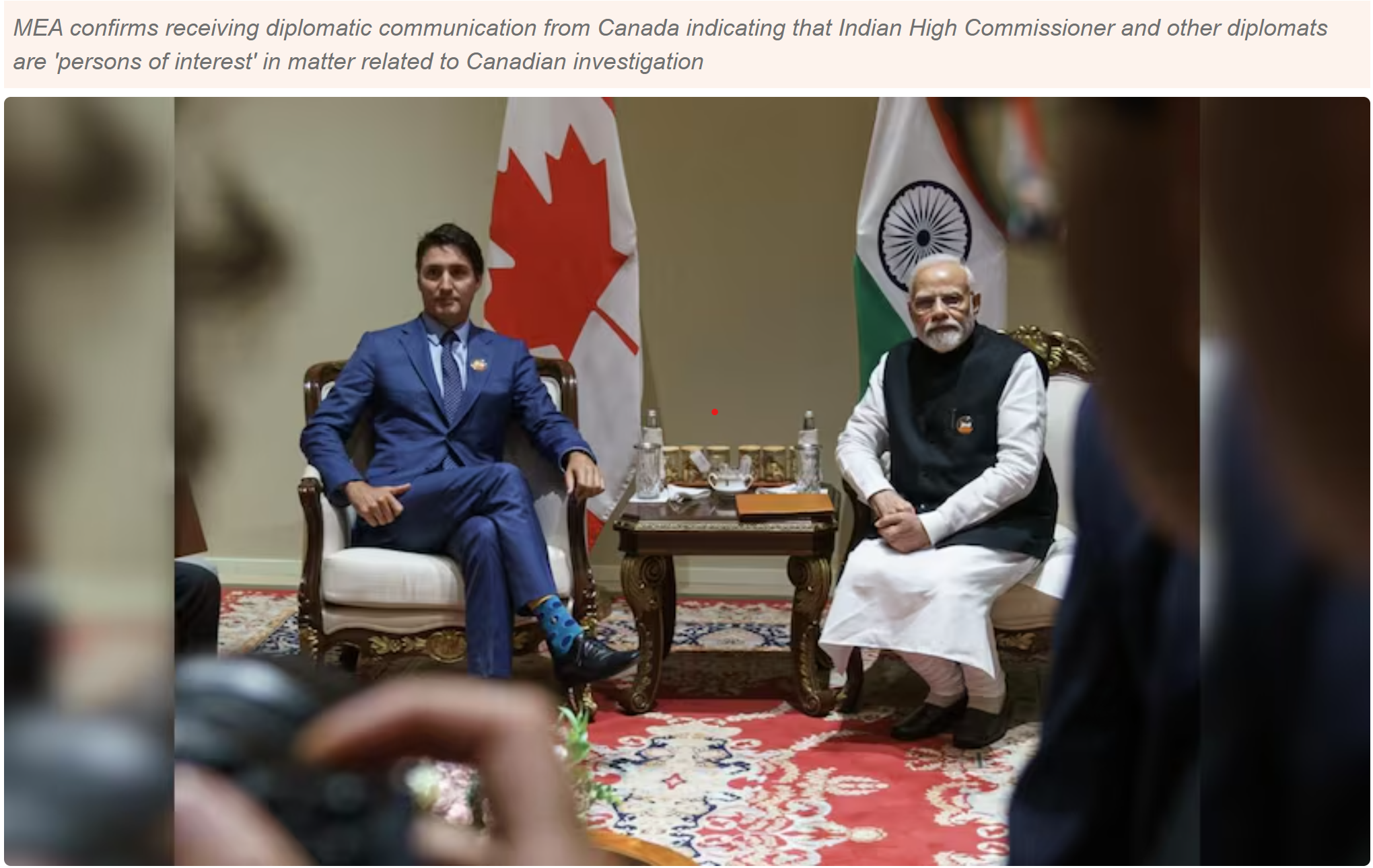India - Canada Relations

- 18 Oct 2024
In News:
India-Canada relations have recently faced serious setbacks following allegations of India's involvement in the killing of Khalistani leader Hardeep Singh Nijjar in Canada. These claims have led to escalating diplomatic tensions and mutual expulsions of diplomats between the two countries.
Recent Developments in India-Canada Relations
- Assassination of Hardeep Singh Nijjar:
- Nijjar, a prominent Khalistani leader, was assassinated in British Columbia, Canada.
- The Canadian Prime Minister accused Indian officials of involvement, which India has denied as "absurd."
- Diplomatic Fallout:
- Both nations expelled each other's diplomats, reducing diplomatic staff and freezing consular services, exacerbating the tensions.
- Support from the Five Eyes Alliance:
- Canada enlisted the Five Eyes intelligence alliance to gain international backing amid the escalating diplomatic crisis with India.
What is the Five Eyes Alliance?
- About:
- The Five Eyes is a multilateral intelligence alliance composed of Australia, Canada, New Zealand, the United Kingdom, and the United States.
- These countries cooperate on signals intelligence under the UK-USA Agreement.
- Expansion:
- The alliance later grew into the Nine Eyes and Fourteen Eyes alliances, incorporating additional countries like the Netherlands, Denmark, France, Norway, and others.
Key Areas of India-Canada Relations
- Political Relations:
- Diplomatic ties began in 1947, with both countries sharing democratic values, human rights, and pluralism.
- Collaborative efforts in global forums like the UN, G20, and Commonwealth focus on climate change, security, and sustainable development.
- Economic Cooperation:
- Bilateral trade in 2023 was worth USD 9.36 billion.
- Canada is the 18th largest investor in India with investments totaling USD 3.3 billion (2000-2023).
- Ongoing Comprehensive Economic Partnership Agreement (CEPA) negotiations aim to boost trade in goods, services, and investments.
- Diaspora Connections:
- Over 1.8 million people of Indian origin in Canada, contributing significantly to cultural and economic exchanges.
- Canada is home to one of the largest Indian diaspora populations globally.
- Education and Space Innovation:
- IC-IMPACTS promotes joint research in healthcare, agricultural biotechnology, and waste management.
- Space collaboration includes partnerships between ISRO and the Canadian Space Agency.
- Indian students represent nearly 40% of Canada's international student population.
- Nuclear Cooperation:
- A 2010 nuclear agreement allows the supply of uranium to India and establishes a Joint Committee for oversight.
- Strategic Importance:
- India’s role is key in Canada’s Indo-Pacific strategy, including collaboration on maritime security, counter-terrorism, and regional stability.
Challenges in India-Canada Relations
- Diplomatic Immunity Issues:
- Canada invoked the Vienna Conventions to protect its diplomatic staff amid tensions, with both sides highlighting the importance of maintaining diplomatic norms.
- Khalistan Issue:
- India views Canada’s tolerance of Khalistani separatist groups as a threat to its territorial integrity.
- Canada’s investigation into India’s alleged role in Nijjar’s assassination has exacerbated diplomatic mistrust.
- Economic and Trade Barriers:
- The political rift has stalled negotiations for the CEPA and slowed bilateral trade.
- Canadian investments in India face increased uncertainty due to deteriorating relations.
- Visa and Immigration Delays:
- Reduced Canadian diplomatic staff in India has caused significant delays in visa processing, especially for students.
- Geopolitical Implications:
- Tensions between India and Canada risk damaging India’s reputation on the global stage, particularly if allegations of intelligence overreach are substantiated.
- Canada’s membership in the G7 and ties with the Five Eyes make the situation complex, affecting relations with other strategic partners of India, including the US, UK, Australia, and Japan.
The Vienna Convention on Diplomatic Immunity
- Vienna Convention on Diplomatic Relations (1961): Establishes the framework for the treatment and protection of diplomatic missions and their personnel.
- Diplomatic Immunity: Diplomats are protected from arrest and detention by the host country.
- Inviolability of Diplomatic Premises: Diplomatic missions cannot be entered without permission.
- Protection of Consular Officers: Ensures consular officers can assist their nationals without interference.
Way Forward for India-Canada Relations
- Address the Khalistan Issue: Engage in active dialogue to resolve concerns about the Indian diaspora and the Khalistan movement, respecting each other’s sovereignty.
- Strengthen Economic Ties:
- Revitalize CEPA negotiations, with a focus on sectors like technology, renewable energy, and infrastructure.
- Enhance trade and investment frameworks for mutually beneficial opportunities.
- Balance Geopolitical Interests:
- Both nations should navigate relationships with major powers like the US, China, and Russia with care.
- A cautious approach is necessary to maintain strategic partnerships without further conflict.
- Leverage Multilateral Platforms: Utilize forums like the G7 and Five Eyes to address global challenges and promote shared values, while working to stabilize bilateral ties.
Conclusion
India-Canada relations are at a critical juncture due to recent tensions. While historical ties and shared interests provide a strong foundation, the diplomatic fallout requires careful management. Both nations must seek ways to restore dialogue, address sensitive issues like the Khalistan movement, and focus on economic cooperation to stabilize and strengthen the relationship moving forward.
